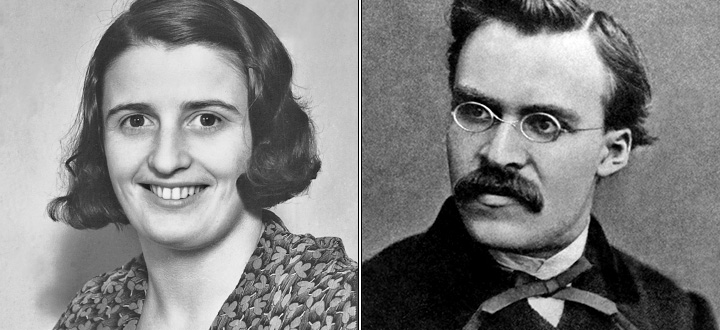
The Best Kindergarten of Communism Possible: Ayn Rand, Nietzsche, and Conservatism
“But Nietzsche’s influence saturated Rand’s writing in a deeper way, one emblematic of the overall trajectory of the right since its birth in the crucible of the French Revolution. Rand was a lifelong atheist with a special animus for Christianity, which she called the “best kindergarten of communism possible.” Far from representing a heretical tendency within conservatism, Rand’s statement channels a tradition of right-wing suspicion about the insidious effects of religion, particularly Christianity, on the modern world. Where many conservatives since 1789 have rallied to Christianity and religion as an antidote to the democratic revolutions of the eighteenth and nineteenth centuries, a not insignificant subset among them have seen religion, or at least some aspect of religion, as the adjutant of revolution […] When Rand inveighs against Christianity as the forebear of socialism, when she rails against altruism and sacrifice as inversions of the true hierarchy of values, she is cultivating the strain within conservatism that sees religion as not a remedy to, but a helpmate of, the left. And when she looks, however ineptly, to Aristotle for an alternative morality, she is recapitulating Nietzsche’s journey back to antiquity, where he hoped to find a master-class morality untainted by the egalitarian values of the lower orders.”
The above passage come from Corey Robin’s wonderful book The Reactionary Mind. I don’t have much time for adult reading these days but I’m slowly making my way through it.
Robin is a political theorist and the book is about the history of conservative political philosophy. In the passage above, Robin is discussing the famous conservative libertarian, Ayn Rand, and her affinity for some of Nietzsche’s more twisted thinking. I absolutely despise Rand’s writing, but I will say that her intuition (and Nietzsche’s) about Christianity being a harbinger of egalitarian forms of social organization, like socialism, is pretty much on the mark, I agree. And this is a good thing, in my opinion.
In regard to Nietzsche, I gotta say, there was always something that bugged me about him. I mean, I appreciate his criticisms of supernaturalist, traditional theistic versions of God, etc., but existentialism has never really been my bag, to be honest. It’s too bleak, rationalistic, and individualistic; much of it anyway.
Two tangential connections to share after reading this part of Robin’s book:
First, some recent research I just read about that says “social exclusion creates a feeling of meaninglessness.” It doesn’t take a humongous leap to imagine that Nietzsche and other famous existentialists considered themselves societal outcasts…
Second, a quote from Robin Marie’s blog post (where Corey Robin’s theory of Nietzsche being a conservative is mentioned): “Angry, horny, narcissistic young men – who think they are much more clever than they actually are – are the sort of people that will chronically misinterpret Nietzsche…it might do well for us to reconsider why we so easily dismiss the not terribly unusual cases of individual readers picking up on the darker edges of Nietzsche – the Nietzsche that seems to celebrate violent self-expression that takes not the time to pity its victims, the Nietzsche that despises democratic culture and egalitarianism as the herd morality of slaves, the Nietzsche that promotes misogyny.”
Additionally, Corey Robin also wrote an essay a few years ago about the neoliberal politics of the Austrian school, connecting Nietzsche and the right.

0 Comments